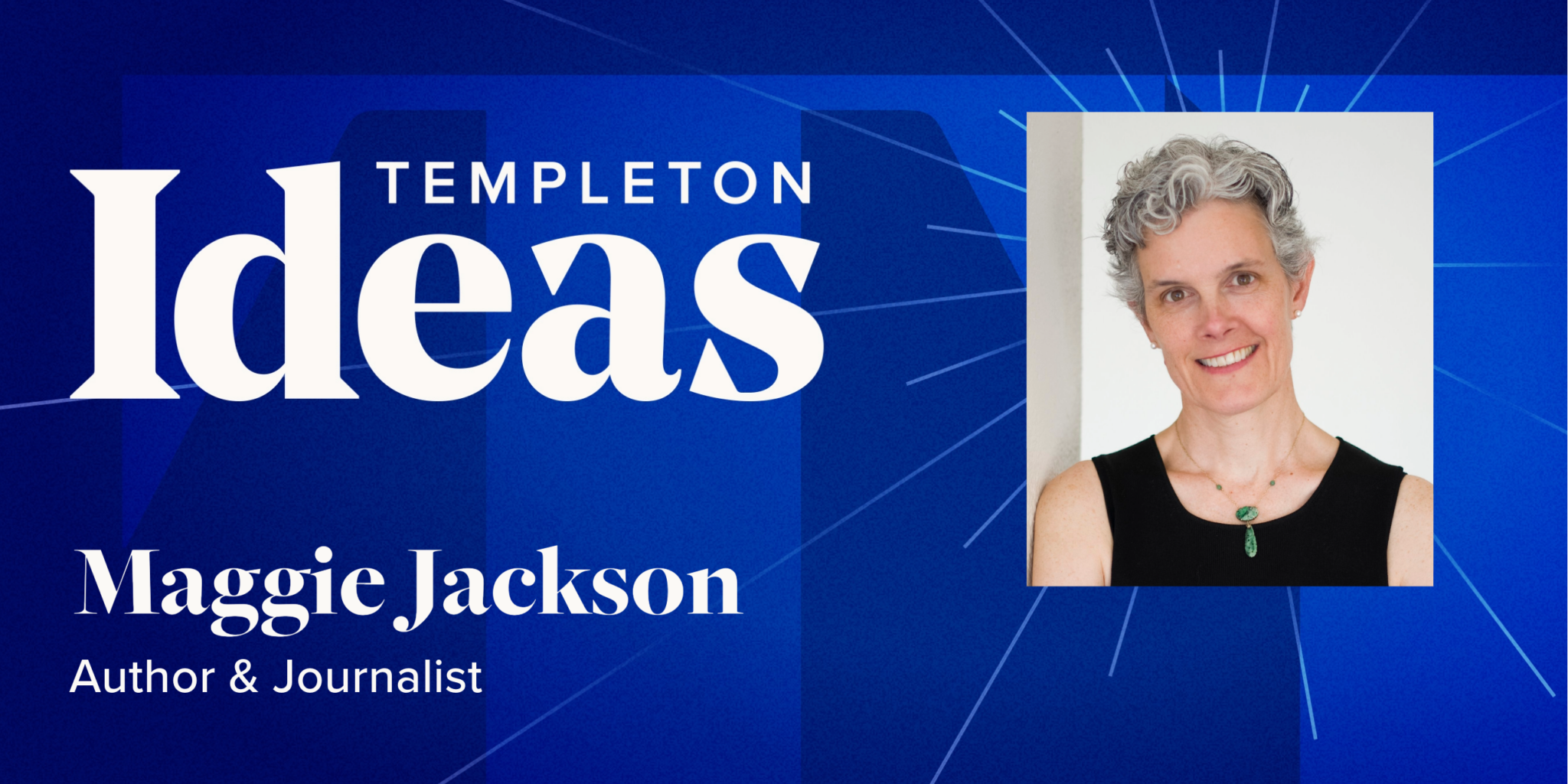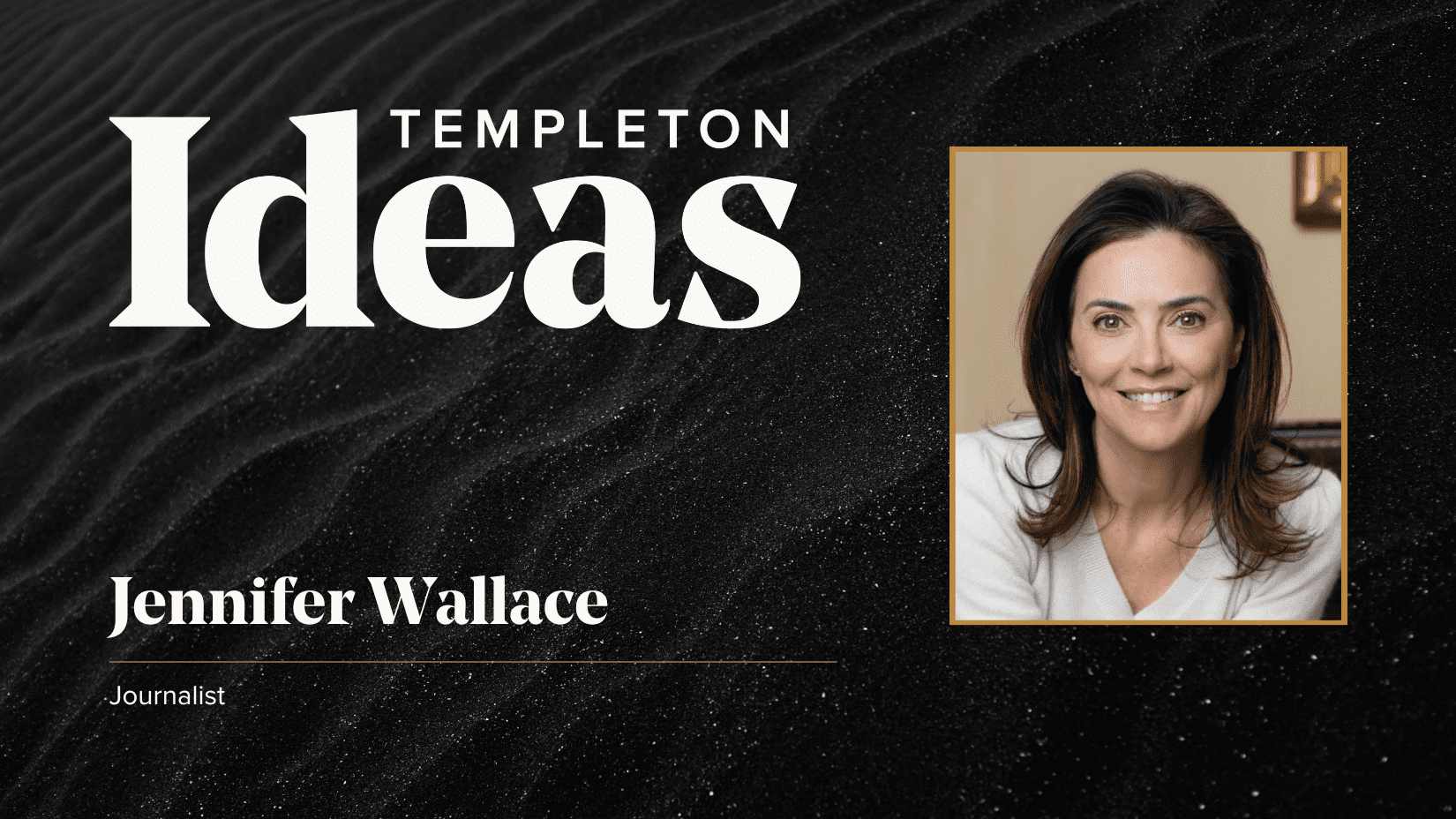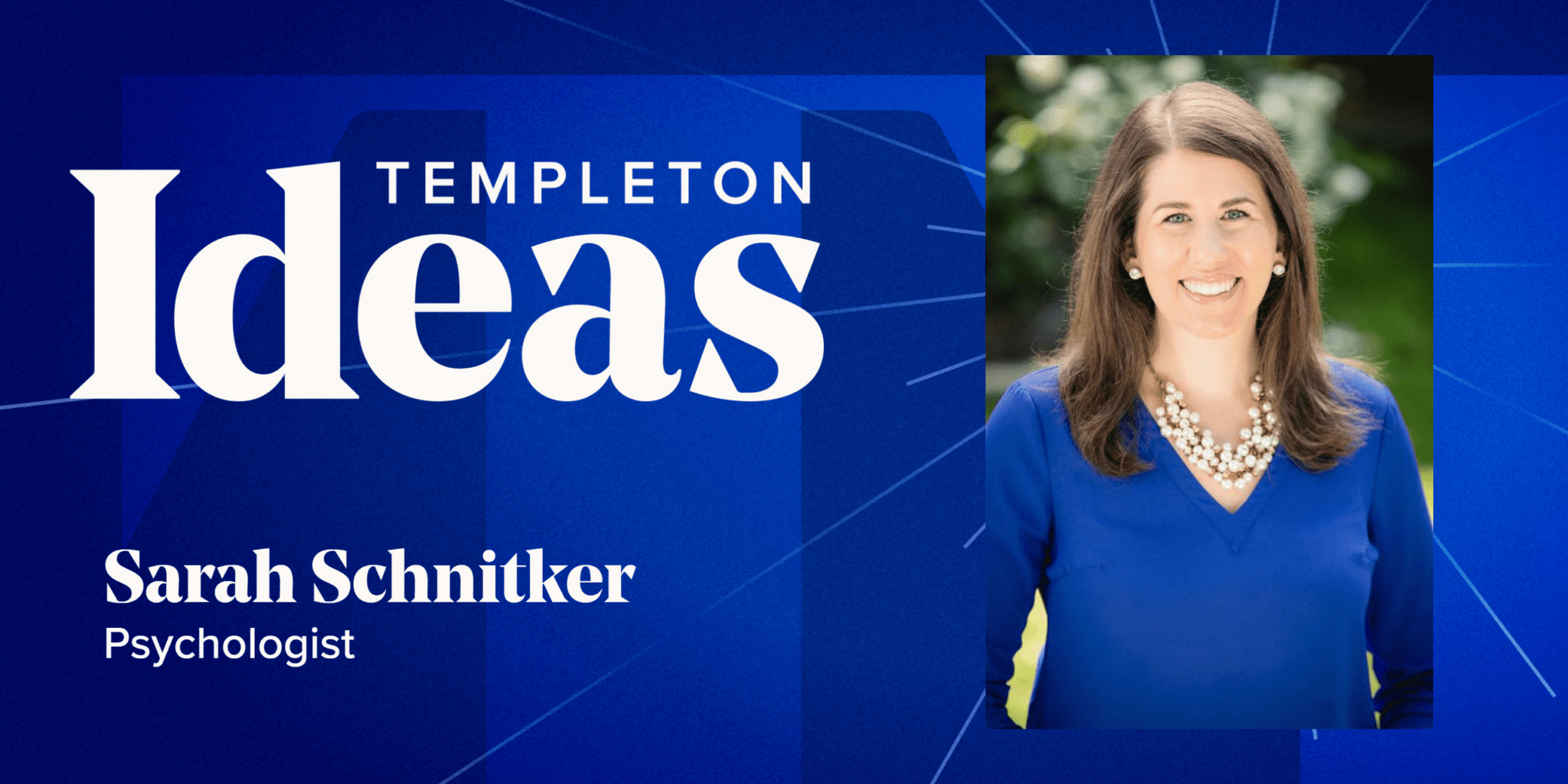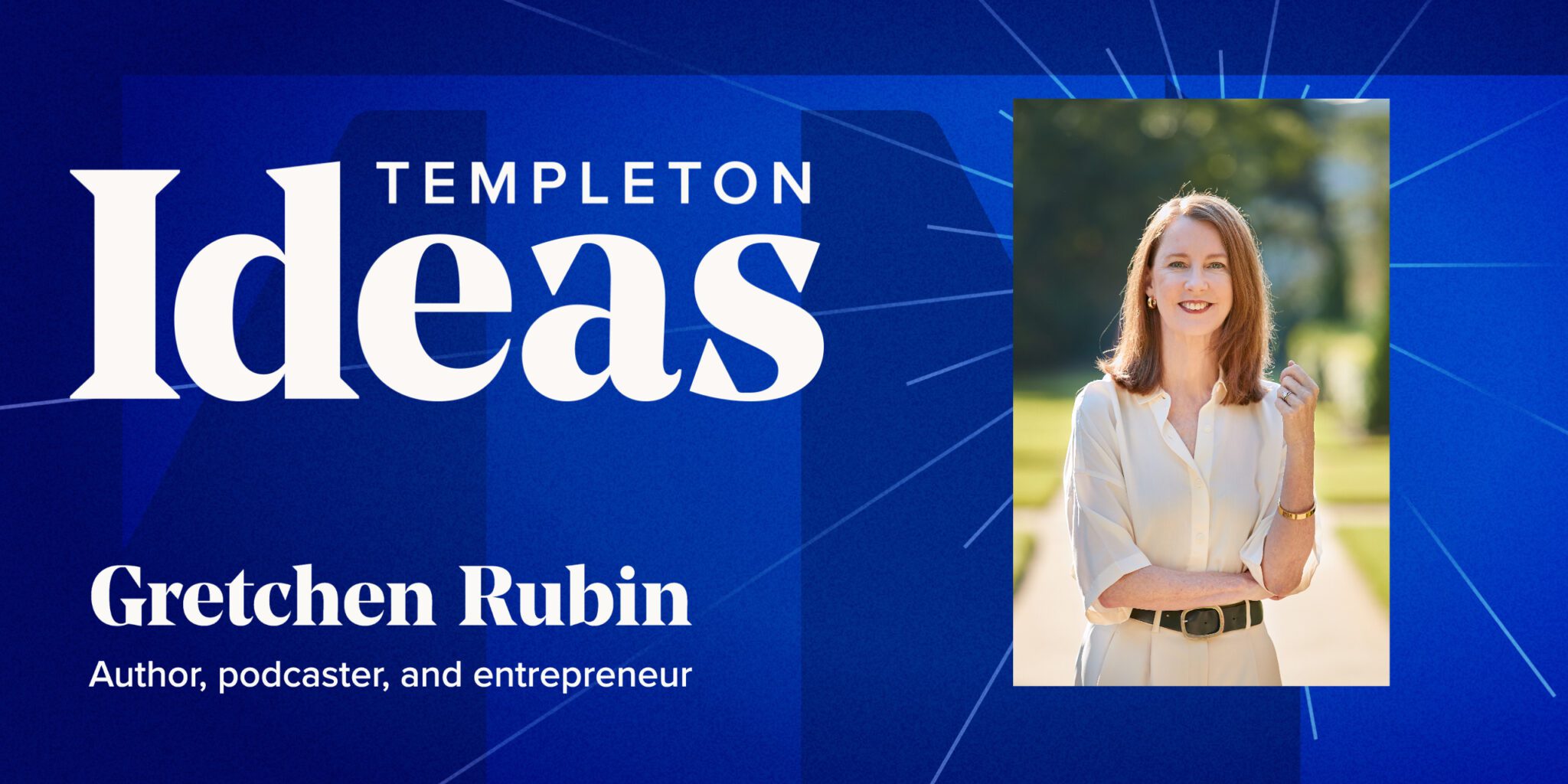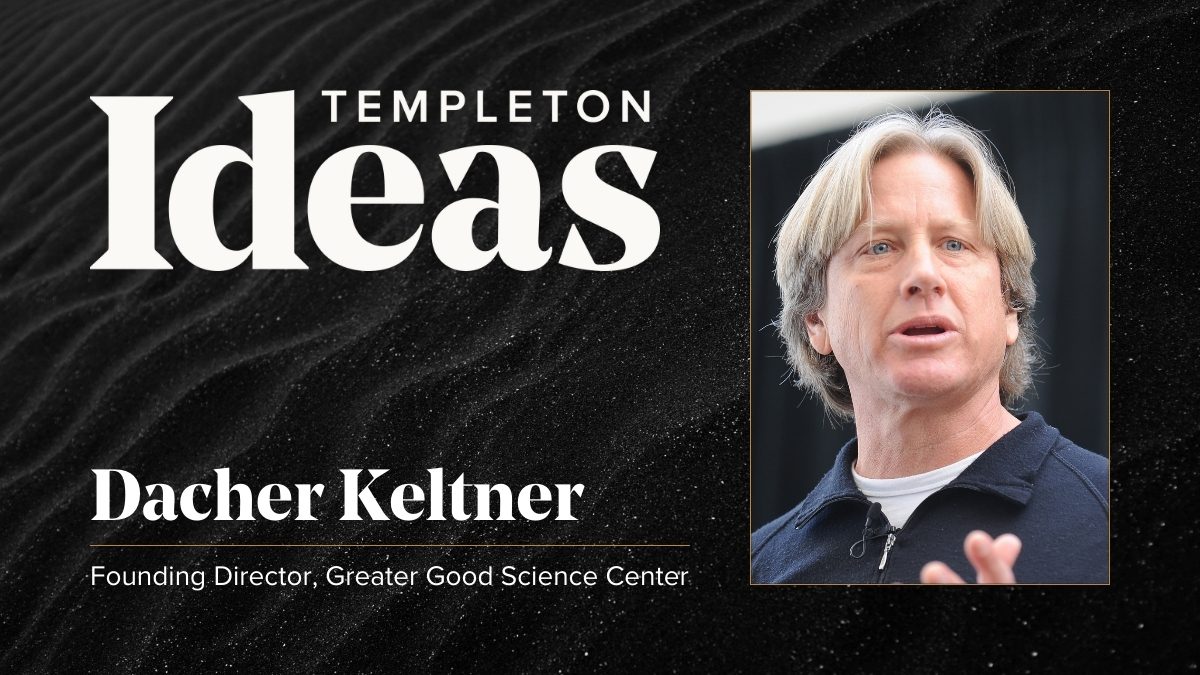The Templeton Ideas Podcast is a show about the most awe-inspiring ideas in our world and the people who investigate them.
Transcripts of our episodes are made available as soon as possible. They are not fully edited for grammar or spelling.
Maggie Jackson is an author and journalist known for her pioneering writings on social trends, particularly technology’s impact on humanity. Her essays, commentary, and books have been featured in The New York Times, The Wall Street Journal, LA Times, New Philosopher, and National Public Radio. Maggie’s work explores the travails facing modern society, including the steep cost of our tech-centric, attention-deficient modern lives. Her latest book is Uncertain: The Wisdom and Wonder of Being Unsure. Maggie joins the podcast to explain why we should rethink our attitudes on uncertainty, how uncertainty and curiosity are related, and the potential applications of uncertainty for artificial intelligence.
Tom: With us on the show today is Maggie Jackson. Welcome to the show, Maggie.
Maggie: Thank you so much. I’m excited to be here.
Tom: I wanna begin our conversation today asking you about yourself. Take me back to your childhood. Where did your curiosity about the world lead you as a kid?
Maggie: I was a very curious kid, as you might imagine, and I think about this question a little bit in terms of uncertainty. I was adopted at 10 weeks old into a family in Boston, and there was a fair bit of sort of unpredictability in the family.
So I, having done a lot of research on uncertainty, I sort of have been thinking about how this, you know, kind of upheaval-ridden childhood actually made me very, ironically, both paradoxically drawn to uncertainty, but at the same time, I’m always kind of alert and aware for what’s coming down the road.
As I was talking to someone who said, “I’m always looking for the exits” to describe his childhood of chaos. And I’m the same way, which I’ve learned in the book can be a real strength. So yeah, my childhood made me both curious and. able to poke my nose into the world and be, I think, fairly observant about what’s going on around me.
Tom: Well, I want to turn now to talking about some ideas in your new book. It’s entitled Uncertain, Wisdom and Wonder of Being Unsure. The provocative title makes me definitely want to turn the pages to investigate what’s in there. Uncertainty, a first impression I think most of us have is this is something that we want to minimize in our lives.
Uh, even eliminate if we can, but you’ve done deep dive in uncertainty, and I’d like to know if we should rethink that attitude and look at uncertainty differently based on what you’ve discovered.
Maggie: That’s exactly what my book is about. Really, we need to redefine our assumptions and our biases against uncertainty, and also in doing so, rethink what it means to know.
That’s really the question I started asking when I began this book, you know, uncertainty is innately unsettling, of course, humans and other organisms need answers. And so we’ll always be highly unsettled by confronting something new or ambiguous or unexpected in our environments. Just briefly, the neuroscience behind this moment of unsettling uncertainty shows us that actually there’s a whole other side to uncertainty that we have missed.
Basically, when you do meet up with something new, you’re flooded with neural changes in the brain related to neurotransmitters and stress hormones. These are stress-induced changes, as you can imagine. And so that’s where the unease comes from. But at the same time, the brain is actually being readied to update its knowledge of the world.
And in a nutshell, it’s good stress. And so by cutting short that moment, we are actually, you know, squandering or missing, cutting short opportunities to learn, to grow, to broaden our cognitive horizons.
Tom: Next time I find myself in an uncertain situation. I’m apt to feel some anxiety, some stress, maybe a sense of panic or foreboding. How can I reframe, if I find myself in a situation where I think, here I go again, are there some things I can literally just tell myself and think differently about the scenario to perhaps respond better and not feel so anxious and stressed?
Maggie: Yes. Well, I think the first step is just understanding uncertainty as something positive, you know, because once we inhabit or stay with that uncertainty, as unsettling as it is, that gives us a space for deliberation. It gives us a time for pausing, for quiet, et cetera. So, I think there’s a lot of work going on right now across the world that are teaching people to be quote unquote tolerant of uncertainty.
They’re teaching, uh, scientists and psychologists, but also physicians are teaching patients and non-patients to reappraise uncertainty and to understand what’s going on. And then it’s not necessarily disastrous or necessarily synonymous with weakness or, or a negative experience. And then they’re using sort of a form of exposure therapy to allow people to try it on, to stick your toe in the water, try, you know, and, and that involves doing something new, doing something different than normal.
But I think what’s really fascinating about this, and it circles back to my first point, is that the people who are learning to sort of try on and, and remove some of their fear about uncertainty are actually using uncertainty itself. You know, the, the, the jolt of not knowing that sense of unusualness, as one researcher calls it, is actually being turned back on uncertainty itself.
So people in these interventions are being asked to predict, oh, what will happen on a first date? And this is something that someone might just back out of. Or, you know, keep cancelling or postponing because they’re afraid of what might happen, the fear of the unknown. If you actually ask yourself and go forward with this experience of that’s riddled with unknowns and not knowing, and find that it’s not so disastrous, or maybe it’s a little disappointing, or maybe it’s fabulous, you find that there are multiple possibilities.
And that’s one of the very important points related to uncertainty. It’s a space of possibility.
Maggie: When you shut your mind, when you close the door, when you’re certain you’re going forward in one way only and when you’re open up to uncertainty on the way to resolve a problem or get an answer, you’re suddenly in the space of multiple possibilities including multiple perspectives on others.
Tom: Talk to me about how are uncertainty and curiosity related.
Maggie: Well, that’s a fascinating sort of subplot to my book, I came across this wonderful vein of research that is the science of curiosity, and that is that people who are highly curious. are often able to withstand the discomfort of the unknown when they’re being highly curious. And what’s really fascinating is this facet of the curious personality called stress tolerance is the aspect of curiosity most related to well-being.
Maggie: So the people who can, although it’s awkward and difficult, pursue knowledge and explore are the ones who are, for instance, at work. More likely to express dissent, they are more likely to ask questions at work, and they’re also They have more mental well-being and that’s fabulous because we sometimes think of curiosity in this sort of light hearted, you know, six year old way as being just being open and asking questions, but we forget the other side of the story, which is that it is uncomfortable to do so.
And I think that that’s really important.
Tom: I’m imagining someone, say, at some point in my past or other people I know, find themselves really struggling with anxiety. I mean, is there something we can kind of do just to experiment on ourselves of the way that we navigate uncertainty and kind of the unknown?
Maggie: Absolutely. In fact, some of the interventions that are now focusing in on uncertainty tolerance, so-called uncertainty tolerance, to treat mental illness and seeing this as a root cause of many, many mental disorders, from eating disorders to PTSD, are now actually treating anxiety with, you know, teachings and trainings to practice uncertainty.
And one of the hands down, bottom line takeaways I found from studying uncertainty for years was that it is, it’s all about approaching life. Uncertainty is a kind of wakefulness, you know, as a result of that neural arousal that occurs when you meet something new. Uncertainty is really about waking up and then being adaptive, being nimble, being at the edge of what you know.
So, so when you can have uncertainty woven into your life, that means you’re really… a little bit less in control of your life. You’re relinquishing a little bit of control of your life. And you’re also at the, at the edge of what you know. And that’s exactly where the human being thrives. That’s where learning occurs.
And there’s a wonderful concept. That’s in childhood education development, et cetera, called the zone of proximal development. That’s usually commonly taken to refer to the zone or the arena where a child is doing something new and maybe needs a little scaffolding help from a parent, but actually it refers in a meta way to what we all experience.
The zone of proximal development is being right at the edge of where your comfort zone ends. Basically, that’s where we want to operate. That’s where the very best experts and surgeons and musicians operate. And so they’re always getting a bit better, and that’s where we learn because we’re not retreating and clinging to what we already know, which occurs when in, in collaborative situations, in companies where people are proven to just usually talk about what’s already known by the group and miss what is called a hidden profile. So again and again and again in this book, to my delight, I found that, you know, this uncertainty is all about frontier work. It’s about threshold work. It’s about moving forward. And yet, we treat it in our culture as a kind of shameful flaw.
And we treat it as something that’s conducive or synonymous with inertia. We couldn’t misunderstand uncertainty more.
Tom: I want to follow up in your comments, kind of linking uncertainty and workplace culture. In your book, you talked about NASA’s Mars Explorer rover mission. I think it launched in maybe 2003.
Tom: What was the purpose of that mission, and what made it so successful?
Maggie: Yes, it’s a fascinating story. The Mars Explorer rover mission was a collaboration that went on for about 17 years, involving teams across the world in multiple disciplines, you know, highly diverse scientists coming together to put rovers, which are basically little robots, on Mars for the first time.
And I’ll preface this also by saying that because, uh, this was so new and so innovative, you know, numerous, numerous computer scientists and sociologists and anthropologists and psychologists were studying this team because it was so innovative. And so we have a lot of data and understanding about what made the Mars rover missions succeed.
And basically, the bottom line was a lot of it had to do with uncertainty. Now, how could that be?
Basically, the missions constantly cultivated conflict and disagreement. And we might say in this day and age, oh, we need less conflict, but I would say, no, we need more. Now, respectful, mild, frequent conflict is related to better performance, deeper discussions, more accuracy in a group, etc. But what’s really the fuel behind that conflict?
It’s not that one side manages to ascend to supremacy and beat out the wrong answer by the other side, which is sometimes the way we treat conflict today. It’s actually that the, a voice of dissent, a differing opinion, actually, even if wrong, will jolt a team off the sort of rush to accord that’s so common.
Only by being unsure as a group or as a person, can you actually know what you don’t know. So you’re thrown away from accord. You’ become in this situation where you’re questioning, you’re more skeptical. And that’s how people find out what they don’t know and what could be more important. As I write in the book, you know, why come together to be less than the sum of our remarkable parts?
Maggie: And uncertainty drives a tremendous kind of collaboration.
Tom: What would you say is maybe the basic set of ingredients for knowing that you’re having a productive disagreement? Is there a checklist that I can appeal to of like, am I headed down the wrong right path or the wrong path here?
Maggie: Well, I think that I mentioned respectful discussion, you know, that would be a starting block about mild and frequent are important words here.
Disagreements should be just a matter of daily life. They should be, uh, you know, something in which, you know, people feel they move forward. And studies show that in workplaces where this occurs, people are more engaged with their work and they also feel more energized, which is fascinating because the neuroscience of the agreeing or disagreeing brain shows that the disagreeing brain is more energetic in the words of one neuroscientist so that, you know, we are actually just activating more of our brain when we’re disagreeing with someone than when we fall into the sort of more easy, comfortable cognition called agreement.
So I think that those are very, very important markers of good conflict that leads people onto the higher ground of the kind of disagreement that’s built on uncertainty, not knowing. There’s a form of humility here.
Tom: Tell me a little more about that. Where does humility fit into the picture?
Maggie: Well, I was really intrigued because while I didn’t do a deep dive into all measures of humility because, you know, I was contending with my wrestling uncertainty to the ground in this book.
Um, but I was really interested that I went back and looked out of curiosity at how I had used the term and when it came up in my book, I used it in reference to Martin Luther King’s rise. His rise to power in the civil rights movement was, you know, embedded with both conviction and humility. I used the term in referencing a surgeon who really, you know, tried, has been trying to hold up a new kind of vision of surgical judgment as being built on both prowess and humility So again and again, I found that the humility to me is strength and I was seeing humility in people who had a certain strength strengthened by uncertainty at one definition of uncertainty is the awareness of the limits of your knowledge.
And that’s perhaps where humility comes in, in the awareness that you, you’ve reached the limits of your knowing that you’ve reached that edge of the known. And you’re, you know, you’re good with that. I don’t see it. And I never have, personally, I don’t see humility as being the kind of lowliness That is often trotted out as a definition in dictionaries. I see it as strength
Tom: After the break, Maggie discusses the relationship between uncertainty and artificial intelligence and she identifies transformative moments of uncertainty in her own life.
MIDROLL
Abby: Now, let’s get back to our conversation.
Tom: I want to turn to the relationship between uncertainty and artificial intelligence. That pairing is not something I’ve ever seen together. So how, how might uncertainty be useful in the development and deployment of artificial intelligence?
Maggie: To back up a little, AI is generally has been founded since the 1950s on one definition of intelligence.
And that is a rational being can pursue and achieve its goals. But the drawback and the danger is that the robots and the models that we’ve created are actually just designed to affect a goal however they can. That’s why robots are still so dangerous in factories. That’s why models go so off track or an autonomous car gets completely off track just by seeing a sticker on a stop sign.
And so somehow to make our robots and models with more bendability, teachability, and so therefore make them more safe and stoppable, which is a huge issue. The fact that this has moved from a theory to reality and is being actually, you know, robots, et cetera, being designed in laboratories. This is being used, uh, in the real, in the real world are beginning to, I think that’s really important given the enormous influence that technology has on us.
I mean, look at how deeply, you know, the, the timing, the instantaneity, the format of our devices shape what, what we think. What knowing is today or what it means to relate to someone, even our ideas of the brain that we are, they think that, you know, we’re programmed to do. So, you know, we’re, we’re uploading our experiences, et cetera.
All of this influence of technology could be turned. Perhaps for good, or at least augmented or countered by the uncertain machine. What if you have a robot housekeeper who stopped and asked, well, how would you like us to fix the coffee or to fetch the paper? And what if you add a robot machine that expected you to be a little more uncertain and give it options?
Perhaps we would kind of grow up with or live our lives with a very different vision of technology, and the relationship with devices and with AI might be wholly changed. And I have been writing about technology since the mid 1990s, a very, very long time, and getting increasingly disturbed, alarmed, not hopelessly so, but this idea that we could make what I call the “I don’t know robot” actually made me more hopeful about technology than anything I’ve discovered or thought in, in a long, long time. And I also would love to add that this work really is important because it counters the highly outdated ideas that we have that the brain is a machine.
And in fact, the human brain is a deficient machine compared to artificial intelligence. This chapter gave me such a sense that the, the brain, of course, is a natural, moving, evolving, organism, part of our own biological self. And so we don’t do it justice when we put it in this rigid box and think of these metaphors.
And we, I think that what’s important is when you believe in uncertainty, you’re having faith in the human mind.
Tom: Yeah, I want to turn with the time we have remaining a couple more personal questions. I think this will be fun. This draws a little bit on your book here. So imagine you’ve got a serious medical condition that requires surgery. You can see where I’m going and you’ve got to choose a surgeon who’s going to perform this complex long, you know, uncertain surgery. Would you ideally choose a surgeon who is a veteran who moves quickly and decisively or someone who’s more on the novice side who might be more indecisive and hesitant at critical junctures?
Maggie: Sure, I would choose the surgeon who has, you know, great expertise is what I write. My problem was, but who was able to have that beginner’s mind that you reference, you know, someone who did truly believe that knowledge, uh, was something that was ongoing.
I would choose what I call or what is called the adaptive expert. And that’s the person who is willing to deliberate, willing to work at the edge of what they know. And that’s in contrast to, I think, the kind of expert that in many professions that we put on a pedestal, which is the routine expert. So in essence, the person who’s dealing with quick, automatic, honed types of knowledge and answers, you know, who has learned through time to act, you know, quickly and with facility in a situation is very, very good.
And yet there’s a ceiling there and that kind of idolatry of the person who’s most quick, most sure, you know, has the answers, is shortchanging us, and the idea of expertise itself. Uh, what you really want is someone who, who doesn’t just operate smoothly in the benign, which is where the routine expert’s prowess ends.
You want someone who really operates well when things go wrong. And it’s really important to, to find a person, and I think, well, how can you tell? I was in, Toronto operating rooms watching surgeries, and, you know, I was accompanied by a phenomenal expert in surgical judgment who studies these, precisely these issues, Carol Ann Moulton.
We were viewing one of her peers. Who was knowing that I was in the room to hear about expertise and her ideas about this actually, you know, kind of skidded into a near miss because of his hubris. You know, he was talking all the time. He was kind of flirting with a nurse or hurrying through it. And he just thought he knew and he didn’t want to admit that he didn’t know.
And, and, and surgeons, of course, are under a lot of pressure to do that. So it was really fascinating to me to, for me to see right in front of my eyes. And I think that we as patients perhaps can look for a surgeon or a professional who is willing to — And I’ll just add, too, that expert is a person who is willing to be asked a question, who is willing to be respectfully challenged, and, and treat you as a whole person.
Those, I think, are markers of someone who, uh, harnesses uncertainty, even though they are expert. And I’ll just add, too, that expert derives from the Latin for ‘to try’, expiri, to try. That’s a wonderful illustration of what I’m talking about.
Tom: We’ve got a short bit of time remaining, I wonder if you can tell me going back on the on the personal vein, tell me one or two kind of moments of great uncertainty in your life that have been ultimately looking back on it transformative and helped shaped who you are today.
Maggie: That’s a good question. I did have, luckily, you know, early caught cancer in 2016 and I was in a state of great uncertainty, you know, where I was, you know, really overwhelmed by the, just the very basic idea of, you know, not only my mortality, but what could happen. And I have to say that I probably could have done better on the uncertainty front, but I think that it was ultimately a strengthening experience and, and I’m certainly not comparing my experience to anyone or wishing this experience on anyone either. But, you know, I think that it put me into a place where I never thought I quite would be at least that early in my life. Yeah, it was a, a sort of a situation where I think that there were lessons about uncertainty and relinquishing certainty about even the things that we all need, pillars of sureness in our life.
You know, there are two, you know, two, two different analogies I use when describing knowledge, and they come from the, you know, the uncertainty literature. Although the analogies, the metaphors are mine. And people who are highly intolerant of uncertainty treat knowledge as a rock that they hold and defend.
You can just see the limitations, the rigidity that’s, uh, you know, hinted at there. Whereas if you treat knowledge as a tapestry, ever changing, whose strength lies in its mutability, you can kind of see how it’s alright to not know. We can still have conviction. We can still have, you know, scientific findings that we act.
Maggie: We can still move forward and yet know that uncertainty really is all that we have.
Tom: Let’s circle back here to where we started with childhood. If you could travel back in time as yourself, as you are now, and interact with your childhood self. Are there any, any messages you’d like to deliver to that young version of yourself based on who you are now?
Maggie: Well, that’s a, I mean, of course, it would take all day for me to deliver the messages that I’d like to tell, you know, I guess, basically, I would say to my childhood self that, you know.
Hold on to that curiosity, hold on to that childlike wonder, which I think uncertainty is very synonymous with. And I would say maybe just sometimes letting go of worry or fear of what’s on around the corner can expand your horizons. I feel like I’ve always I’ve always poked around the corner, I’ve always peeked around the corner, I’ve always gone around the corner, but sometimes it was a little more discomforting than it, than it had to be.
Tom: Well, we’ve covered a lot of good ground today. I think I’ve been able to, to reach all the questions I was hoping to ask. And I just want to thank you for being on the show today.
Maggie: Oh, you’re welcome. It was a great discussion. I love talking about this. Thank you for your wonderful questions.
Abby: You’ve been listening to Templeton Ideas from the John Templeton Foundation, where we fund research and tell stories that inspire people with awe and wonder.
We’re proud to support leading scientists, philosophers, and theologians from around the world. Learn about the latest discoveries related to black holes, complexity, forgiveness. and free will at templeton.org/news. If you like what you’ve heard so far, follow us and leave us a review wherever you get your podcasts.
Abby: Our program was produced by Jakob Lewis with Great Feelings Studios. Our theme song is by Dan Burns. Our staff includes Thomas Burnett, Abby Ponticello, Benjamin Carlson, David Nassar, and Alyssa Settefrati.
